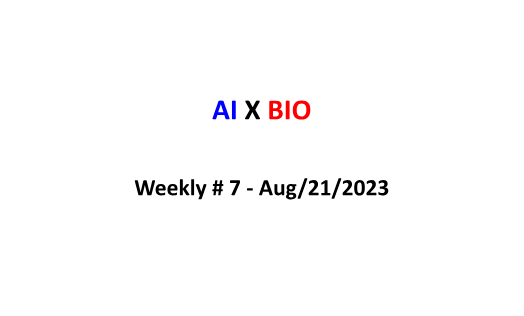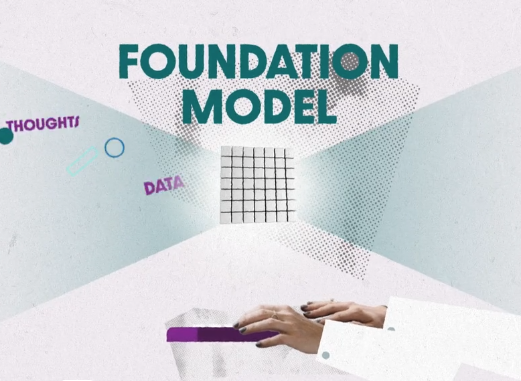- AIXBIO
- Posts
- AIXBIO Weekly #7- Aug /21/23
AIXBIO Weekly #7- Aug /21/23

Featured
Policy & Roadmap
- White House Outlines R&D Priorities for FY 2025: Emphasizing AI, Climate Solutions, and Health Outcomes
The White House released a memorandum detailing the Administration's research and development (R&D) priorities for the fiscal year 2025. The memo underscores the role of public science, technology, and innovation in achieving national aspirations such as health, environmental justice, global security, and economic growth. One of the primary focuses is on the responsible advancement of trustworthy artificial intelligence (AI) technology. The government aims to harness AI to improve public services, mitigate risks, and tackle societal challenges.
#WhiteHouse #RD2025 #AIInnovation
- Bipartisan CREATE AI Act Aims to Democratize AI Research Access
The U.S. Congress has put forth the CREATE AI Act, a bipartisan bill designed to reshape the future trajectory of artificial intelligence. This act's primary objective is to establish a national AI research resource, granting access to essential computing and datasets for academics, nonprofit researchers, and emerging startups. The current landscape of AI research is dominated by tech giants like Google, Microsoft, Amazon, and Meta. These corporations have the financial muscle and data access to engage in groundbreaking AI research, leading to innovations like ChatGPT and generative search. However, their primary motivation remains profit, often sidelining broader, societal considerations. This dominance has inadvertently stifled innovation from academic and governmental sectors. The CREATE AI Act aims to rectify this imbalance by introducing diverse voices into the AI discourse, emphasizing research that isn't solely profit-driven. Such an approach could lead to innovations that benefit society at large, akin to past academic successes like GPS and the internet. Stanford HAI has been a pivotal player in this movement.
#CREATEAIACT #AIResearch #AIRoadmap
Partnerships
- Verily and OneOncology Collaborate to Advance Cancer Research
Verily, a subsidiary of Alphabet, and OneOncology have come together in a strategic collaboration aimed at propelling advancements in cancer research. Central to this partnership is the integration of Verily's innovative Project Baseline platform with the extensive data and oncology expertise that OneOncology brings to the table.
Project Baseline, developed by Verily, is a platform tailored to streamline clinical research. It serves as a bridge, connecting clinical research sponsors, participants, and researchers, thereby simplifying the process of conducting clinical trials. This platform's capabilities, when combined with OneOncology's vast network that spans over 600 oncology practices across the U.S., promise a significant boost in the pace and efficiency of cancer research.
The primary objectives of this collaboration are multifaceted. Firstly, there's a strong emphasis on accelerating the process of clinical trials, ensuring that potential treatments can be tested and validated more swiftly. Secondly, the partnership is dedicated to enhancing patient outcomes, ensuring that individuals receive the best possible care based on the latest research findings. Lastly, there's a commitment to refining the patient experience, ensuring that individuals navigating the challenging journey of cancer treatment feel supported and informed.
#Verily #OneOncology #CancerResearch #ProjectBaseline #DataDrivenOncology #ClinicalTrials
- Abridge Joins Epic as Its First "Pal", Integrating Generative AI for Enhanced Provider-Patient Interactions
In a significant move in the healthcare technology sector, Abridge has become Epic's inaugural "Pal". This partnership is set to bring the power of generative AI to a broader spectrum of healthcare providers and their patients. Abridge's cutting-edge technology is designed to capture and comprehend health-related conversations, thereby enhancing the quality of communication between patients and providers.
With this integration, healthcare providers who utilize Epic's platform will have direct access to Abridge's generative AI capabilities. This means that during patient interactions, providers can leverage AI-driven insights to ensure that patients have a clearer understanding of their health discussions. Such clarity is crucial, especially when discussing complex medical topics, treatment plans, or medication instructions.
#Partnerships #GenerativeAI #HealthcareTech #AIinHealthcare
- Generative AI's Role in Shaping Healthcare Mergers and Acquisitions
Generative AI, with its advanced predictive capabilities, is becoming a game-changer in the realm of healthcare mergers and acquisitions (M&A). The technology's ability to sift through and analyze vast datasets allows it to predict potential outcomes of M&A activities, offering invaluable insights to stakeholders.
In the ever-evolving healthcare sector, M&A activities are on the rise. Generative AI is playing an increasingly crucial role in these processes, helping decision-makers model various scenarios. This modeling capability is particularly beneficial as it provides a clearer understanding of the potential risks and benefits associated with different M&A strategies.
One of the standout features of generative AI is its ability to provide insights that lead to more strategic and informed decisions during the M&A process.
#GenerativeAI #Healthcare #AIinHealthcare #HealthcareTrends
Investment
- Proprio Secures $43M for AI-Driven Surgical Navigation; Paradigm™ Gets FDA Nod
Proprio, a Seattle-based surgical tech firm, announced a successful $43 million Series B funding round. This capital injection is set to accelerate the commercialization of their AI-driven surgical navigation platform, Paradigm™, both in the U.S. and internationally. A significant achievement for the company this year was the 510(k) clearance that Paradigm™ received from the U.S. FDA. This platform, a fusion of light field technology and artificial intelligence, offers surgeons a real-time 3D visualization during procedures. It's designed to enhance surgical precision by combining medical images with live data. One of the standout features of Paradigm is its ability to eliminate the need for intraoperative scans. This not only reduces radiation exposure for both patients and the surgical team but also trims down procedure time by up to 30 minutes.
#Proprio #SurgicalTech #AIDrivenSurgery #ParadigmPlatform #FDA #HealthTech #MedicalInnovation
Fundamentals
- Demystifying Foundation Models: Stanford HAI's Guide for the Uninitiated
Stanford Human-Centered Artificial Intelligence (HAI) has released an informative guide, aiming to elucidate the concept of foundation models for those unfamiliar with the term. Foundation models are essentially large-scale machine learning models that are trained on vast amounts of data. One of their standout features is their adaptability. After their initial training, these models can be fine-tuned to perform a wide variety of specific tasks, making them incredibly versatile in application.
#StanfordHAI #FoundationModels #AIExplained #MachineLearning #AIEthics #BigData #AIGovernance
AI X Regulation & Ethics
- Overcoming Barriers to AI Integration in Healthcare
In a recent opinion piece, Cal Al-Dhubaib, a renowned data scientist and strategist specializing in medical AI, delves into the complexities of integrating artificial intelligence into the healthcare sector. He particularly focuses on the ethical and regulatory challenges that professionals and institutions face in this endeavor. One of the significant highlights of the article is the Parliament's acceptance of the EU AI Act. This act is seen as a monumental milestone in the realm of AI regulation on a global scale. Drawing parallels with the General Data Protection Regulation (GDPR), Al-Dhubaib anticipates that the EU AI Act will have a similar "Brussels effect." This means that it could potentially set the benchmark and become the global standard for AI regulation, influencing policies and practices beyond the borders of the European Union.
#AIinHealthcare #EUAIAct #AIRegulation #MedicalAI #EthicalAI #GDPR #GlobalAIStandards
- Misinterpretation Surrounds AI "Doomsday" Letter: Not All Signatories are "Doomers"
A letter that warned about the potential risks of artificial intelligence, especially in the realm of autonomous weapons, drew significant attention and was signed by numerous AI researchers. However, the media's portrayal of this letter led to a widespread belief that all signatories were predicting a doomsday scenario due to AI. In reality, many of those who signed the letter have since clarified that they do not subscribe to such apocalyptic views.
The primary intention behind the letter was to raise awareness about the ethical implications of AI and the potential for its misuse, particularly in warfare. The signatories wanted to emphasize the importance of responsible AI development and deployment. However, the media's interpretation and subsequent portrayal created misconceptions about the beliefs of those who endorsed the letter.
#AI #DoomsdayLetter #AIResearch #EthicalAI
What Now ?!
- Decoding the Brain's Musical Response: Insights from Pink Floyd
Researchers at Albany Medical Center and UC Berkeley embarked on a unique study using Pink Floyd's “Another Brick in the Wall, Part 1” to understand the brain's response to musical attributes. By recording the brain activity of epilepsy patients exposed to the song, the team aimed to capture the electrical activity of brain regions attuned to music elements like tone, rhythm, harmony, and lyrics. The results were promising. The UC Berkeley team, after analyzing data from 29 patients, successfully reconstructed a recognizable portion of the song from the brain recordings. This achievement marks the first time a song has been reconstructed in this manner.
The study's implications are vast. It demonstrates the potential of recording and translating brain waves to capture the musical elements of speech, known as prosody. These elements, including rhythm, stress, and intonation, convey meanings that words alone cannot express. Such advancements could be revolutionary for individuals who struggle with communication due to conditions like stroke or paralysis.
#BrainResearch #Neuroscience #PinkFloyd #SpeechReconstruction







